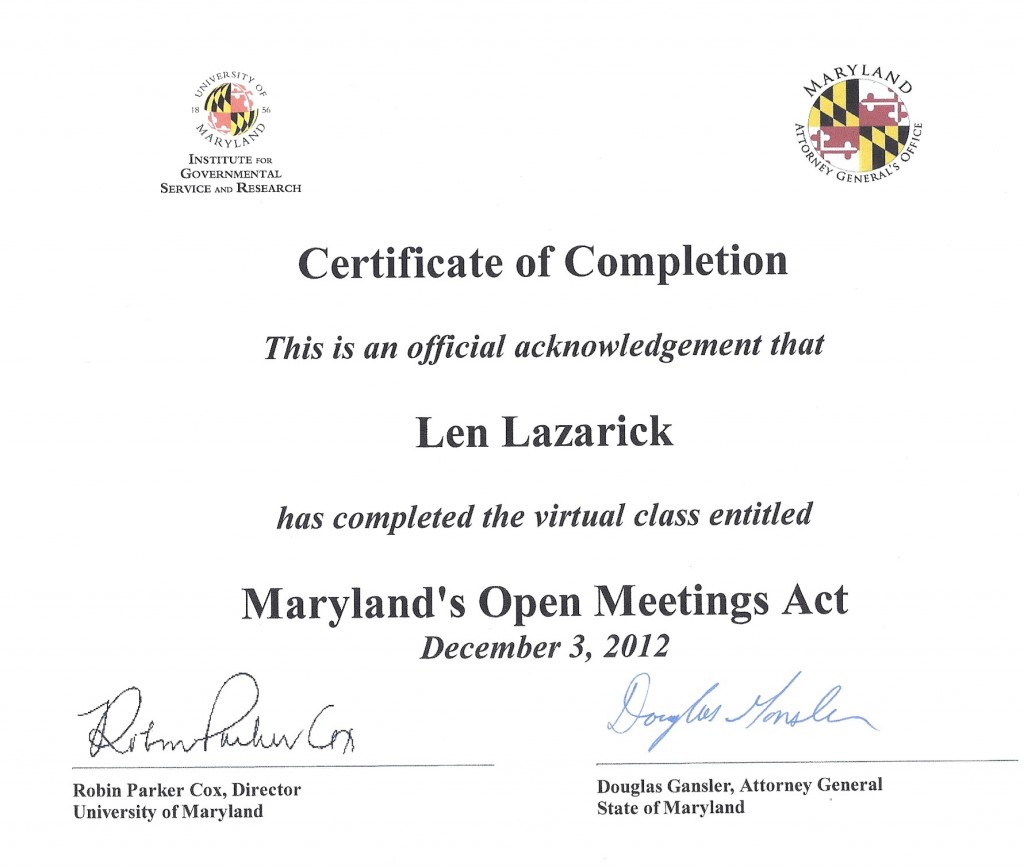Penalties needed for violations of Open Meetings Act, citizens say
By Len Lazarick
[email protected]
The biggest problem with the Open Meetings Act is the lack of any penalty for public bodies that violate the law.
That is the most frequently cited issue in dozens of responses MarylandReporter.com received when it requested comments about problems with Open Meetings law back in October.
A similar problem was cited with the Public Information Act, which establishes the rules for release of documents and electronic information by government agencies. The Joint Committee on Transparency and Open Government is holding a hearing Tuesday morning on the Public Information Act, as it did Oct. 17 on the Open Meetings Act, when the chairman requested suggestions about how to improve the act.
Act is “weak and weasel-worded”
Both acts are “weak and weasel-worded compared to other states,” said reporter Andy Schotz, who’s experienced many a closed meeting.
The problem is long-standing. Since its creation in 1990, the Open Meetings Compliance Board can find a public body in violation of the law but can do nothing but issue an opinion and send the body a letter advising it to change its ways.
Beyond that, the only recourse for someone who files a complaint is to go to court to enforce the law, which only rarely happens. A judge can overturn a decision made in a closed meeting and establish other penalties for violating the law, and even award court costs and attorney fees. But the burden for pursuing the action falls entirely on the complainant.
The main recommendation coming out of the responses is that the legislature establish penalties for violating the act, much as the State Ethics Commission can fine public officials for failure to file disclosure statements – a penalty also rarely imposed.
Associations fought penalty provisions

This is Certificate of Completion for the online Open Meetings course developed by the attorney general’s office and the University of Maryland.
When the Open Meetings Act underwent a major revision in 1990, media and good government types had pushed for penalties and stronger enforcement powers for the compliance board. The move was resisted by all the major associations of public officials – the Maryland Association of Counties, the Maryland Municipal League and the Maryland Association of Boards of Education.
The associations won that fight and no fines or penalties were placed in the law. As one respondent familiar with open meetings enforcement in other states put it, those states that have fines and other penalties for illegally closing meetings rarely if ever impose them.
But raising the issue of penalties again would certainly grab the attention of public bodies in the state. Even the possibility of a small civil fine for improperly closing a meeting or failing to disclose the topics discussed behind closed doors might gain more compliance with the act, especially from boards that repeatedly violate it. The law might also permit the office of the attorney general to sue public bodies for violations of the act, rather than putting the entire burden on people who have been shut out.
Other recommendations: training course, web calendar
Here are some other recommendations for the committee that are less drastic but might foster greater compliance and greater openness in government.
- Require all members of public bodies to take the online training course in the Open Meetings Act created this year by the attorney general. The course provides a good overview of the act, and has short quizzes on sections of the act. After completing the course, it even issues a “certificate of completion” that members of public bodies should be required to have. It takes less than two hours to complete.
- Establish a more uniform way of giving notice of public meetings, said several respondents. Public bodies should be required to post notice of an upcoming meeting on the home page of their websites, if they have one. Another recommended that the state have a single calendar on the Internet that lists all meetings of public bodies by day and topic. The biweekly Maryland Register has a limited list, but it is not uniformly used and difficult to find. The office of the Secretary of State might maintain such a calendar, since it already publishes the Maryland Register
- There were many other proposals for small improvements in the law. But one overarching suggestion was that the Joint Committee on Transparency and Open Government conduct a series of hearings next year in which it invites anyone interested in the law to testify.
This year’s hearings got little public attention before or after the meetings, and the committee could be more proactive in looking for ways to improve both the Open Meetings Act and the Public Information Act. There are much more serious problems with the enforcement of and compliance with the Public Information Act, respondents agree.

MarylandReporter.com is a daily news website produced by journalists committed to making state government as open, transparent, accountable and responsive as possible – in deed, not just in promise. We believe the people who pay for this government are entitled to have their money spent in an efficient and effective way, and that they are entitled to keep as much of their hard-earned dollars as they possibly can.


At a minimum at the start of the 2013 general assembly, I’d like to see bills proposing the recommended changes to the Open Meetings law especially a bill requiring “a more uniform way of giving notice of public meetings.” I’d also like to see a bill requiring meeting agenda and approved minutes posted online. A bill mandating on-line training for members of public bodies got watered down yet died anyway in past years. Both lawmakers and outdated sunshine laws are part of the problem.